|
|
|

|
Chair to head world-class research center
|
by Dawn Brazell
Public Relations
It turns out the ’80s oil bust was a good thing for MUSC’s College of
Health Professions, but it would take a few decades to become apparent.
 Dr. Steven Kautz
shows one of his simulations that reveals how the activity of one calf
muscle influences all segments in the body during normal walking
through the use of realistic mathematical models. Dr. Steven Kautz
shows one of his simulations that reveals how the activity of one calf
muscle influences all segments in the body during normal walking
through the use of realistic mathematical models.
The bust put Steven A. Kautz, Ph.D., who then held a Bachelor of
Science in geophysics, on a path to becoming a biomechanics and
neurosciences researcher. His studies led him into the field of
rehabilitation, with him earning a doctorate in biomedical engineering
from the University of California, Davis. Kautz said he loved finding
out that he could apply his expertise in mathematical analysis and
computer simulations to the clinical setting to change the way therapy
could be done.
Coming to MUSC in July as chair of the Department of Health Sciences
and Research at the College of Health Professions (CHP), Kautz said
it’s an exciting time to be doing rehabilitation research given the
progress in technology and neurosciences.
One of his specialty areas is stroke rehabilitation, with him examining
the effect on a person’s ability to move after blockage of the blood
vessels in the brain happens.
“When a clinician sees a patient right now, they don’t have specific
measurements that say this system isn’t functioning well. They can say
this person walks slowly, but they don’t necessarily know if they walk
slowly because of the way their neural system for balance is working or
just the general level of activation. There are all these different
things that could be what is wrong, but they don’t really have the
tools to discern between those.”
Kautz wants to continue research that will give doctors and therapists
the theoretical framework and measurements toolbox they need to know
the most effective treatment, custom-tailored to a patient’s specific
impairment. That’s one reason he decided to leave his position as
professor in the Department of Physical Therapy and program coordinator
of the movement science track in the Rehabilitation Science Doctoral
program at the University of Florida in Gainesville to come to MUSC.
Attracted to MUSC because of its goal to create an interdisciplinary,
world-class research center, Kautz is eager to begin work in CHP’s
newly renovated laboratory space totaling 5,500 square-feet. The labs
will feature an instrumented split-belt treadmill that can measure 3-D
ground reaction forces, a Vicon motion-capture system that allows human
movement data to be collected at up to 242 frames a second, a
one-of-a-kind perturbation system for investigating balance during
walking, and a high-tech, computer controlled body-weight support
system that assists someone walking over the ground or on a treadmill.
When the laboratory is completed in November, the resources in place
will be among the best in the country for rehabilitation research, he
said.
Mark Sothmann, Ph.D., interim vice president for academic affairs and
provost, said Kautz brings with him a nationally recognized research
program in neuro-rehabilitation and extensive experience through his
work with one of the nation’s best doctoral programs in rehabilitation
sciences at the University of Florida.
He also brings with him the designation as a Veterans Affairs (VA)
Research Career Scientist, of which there are only 174 nationwide. In
addition to his primary appointment in CHP, Kautz also will have a
joint appointment with the Ralph H. Johnson VA Medical Center, and
affiliations with the MUSC Department of Neurosciences and the Clemson
University-MUSC Joint Bioengineering Program. Kautz said the multiple
appointments support the multidisciplinary nature of his research and
the future direction of CHP-based research, featuring collaborative
work in stroke rehabilitation research with the MUSC Center of Economic
Excellence on Stroke Research and multiple other entities.
Kautz said his joint appointment with VA Medical Center is critical.
“The VA is the No. 2 funder of rehabilitation research next to the NIH.
It’s a great funding source as far as being able to build a research
program. It turned out that here, they really embraced having a VA
appointment and a MUSC appointment and building a research program at
both the same time. They saw it the same way I saw it—as a big win-win
situation.”
One goal Kautz has is to change stroke rehabilitation’s “one-size-fits-
all” type approach, he said. Now that technology offers ways to study
the brain in real time, researchers can start to answer questions that
would improve the effectiveness of therapy. For example, he hopes that
in the future EEG technology can help him examine brain activity during
the gait cycle to see how the brain interacts during the process.
“Does someone who has had a stroke need to recruit their brain more to
do something that used to be done by the spinal cord because that
pathway is dysfunctional? Is that why it becomes so mentally taxing for
people to walk? How does the nervous system learn a new motor pattern?”
These will be some of the questions being studied, especially in
conjunction with MUSC’s strong neurosciences program and growing
bioengineering efforts, he said. Kautz envisions building up a stroke
rehabilitation community in the next decade.
“I see us having a critical mass of people doing rehabilitation
research, where we’re known on the international scene as a place that
does some of the best neuro-rehabilitation research. We’ll be
collaborating extensively with clinical neurosciences and the stroke
neurologists and the basic neurosciences. We’ll be collaborating with
the bioengineers to develop new robotic applications that would allow
us to do different kinds of therapy that we haven’t been able to do
before.”
Kautz said CHP is a natural home for him in these efforts because his
first commitment is providing therapists with better tools to improve
the quality of life for patients.
“We want to make sure that we can understand when someone comes in what
their strengths and deficits for being able to change is, and put all
of those pieces together to get the best outcomes for these people.”
CHP's
new
faces
The following are newcomers to the College of Health Professions:
Jesse Dean, Ph.D.
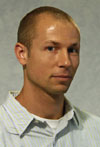 Research
interests: Experimental investigation of the mechanics,
control, and energetics of human movement, particularly locomotion;
Simulation of human movement through computational modeling;
Investigation of nervous system properties through electrical
stimulation of peripheral nerves; Development of rehabilitation
techniques for populations with movement disorders Research
interests: Experimental investigation of the mechanics,
control, and energetics of human movement, particularly locomotion;
Simulation of human movement through computational modeling;
Investigation of nervous system properties through electrical
stimulation of peripheral nerves; Development of rehabilitation
techniques for populations with movement disorders
Heather Shaw
Bonilha, Ph.D.
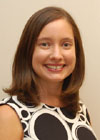 Research
interests: Improving the diagnostic accuracy and treatment of
people with voice and swallowing disorders Research
interests: Improving the diagnostic accuracy and treatment of
people with voice and swallowing disorders
Noelle G. Moreau,
Ph.D.
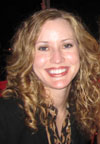 Research
interests: Use of ultra-sound imaging to investigate muscle
architectural plasti-city in response to interventions in cerebral
palsy; Development of effective rehabilitation strategies to enhance
muscle function and quality of life in people with cerebral palsy;
Mechanisms underlying abnormal force production in people with cerebral
palsy and other movement disorders, such as stroke; 3-D Gait analysis
of abnormal movement patterns in cerebral palsy and other movement
disorders, such as stroke Research
interests: Use of ultra-sound imaging to investigate muscle
architectural plasti-city in response to interventions in cerebral
palsy; Development of effective rehabilitation strategies to enhance
muscle function and quality of life in people with cerebral palsy;
Mechanisms underlying abnormal force production in people with cerebral
palsy and other movement disorders, such as stroke; 3-D Gait analysis
of abnormal movement patterns in cerebral palsy and other movement
disorders, such as stroke
Lee L. Saunders,
Ph.D.
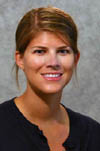 Research
interests:
Traumatic Spinal Cord Injury (SCI); Traumatic Brain Injury
(TBI); Current projects: Rehabilitation Research and Training Center on
Secondary Conditions in Individuals with SCI; Center on Health Outcomes
Research and Capacity Building for Underserved Populations with SCI and
TBI Research
interests:
Traumatic Spinal Cord Injury (SCI); Traumatic Brain Injury
(TBI); Current projects: Rehabilitation Research and Training Center on
Secondary Conditions in Individuals with SCI; Center on Health Outcomes
Research and Capacity Building for Underserved Populations with SCI and
TBI
Mark Bowden, Ph.D.
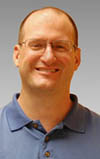 Research
interests: Understanding clinical decision-making relative to locomotor
interventions; Designing clinical treatments in response to improved
understanding of underlying factors related to impaired walking;
Translation of biomechanical laboratory findings into non-laboratory
assessments and clinical intervention Research
interests: Understanding clinical decision-making relative to locomotor
interventions; Designing clinical treatments in response to improved
understanding of underlying factors related to impaired walking;
Translation of biomechanical laboratory findings into non-laboratory
assessments and clinical intervention
Chris Gregory, Ph.D.
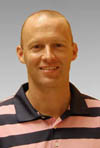 Research
interests: Skeletal muscle physiology; Current projects: VA Career
Development Award examining the impact of skeletal muscle energetics on
the metabolic cost of walking post-stroke Research
interests: Skeletal muscle physiology; Current projects: VA Career
Development Award examining the impact of skeletal muscle energetics on
the metabolic cost of walking post-stroke
Michelle Woodbury,
Ph.D.
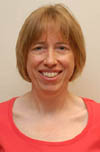 Research
interests: The recovery of arm/hand movement and function in persons
who have had neurologic injury or disease; Provide neuro-rehabilitation
occupational and physical therapists with efficient methods for
measuring arm/hand movement impairment and recovery in persons with
stroke Research
interests: The recovery of arm/hand movement and function in persons
who have had neurologic injury or disease; Provide neuro-rehabilitation
occupational and physical therapists with efficient methods for
measuring arm/hand movement impairment and recovery in persons with
stroke
Friday, Aug. 20,
2010
|
|
|




 Research
interests: Experimental investigation of the mechanics,
control, and energetics of human movement, particularly locomotion;
Simulation of human movement through computational modeling;
Investigation of nervous system properties through electrical
stimulation of peripheral nerves; Development of rehabilitation
techniques for populations with movement disorders
Research
interests: Experimental investigation of the mechanics,
control, and energetics of human movement, particularly locomotion;
Simulation of human movement through computational modeling;
Investigation of nervous system properties through electrical
stimulation of peripheral nerves; Development of rehabilitation
techniques for populations with movement disorders Research
interests: Improving the diagnostic accuracy and treatment of
people with voice and swallowing disorders
Research
interests: Improving the diagnostic accuracy and treatment of
people with voice and swallowing disorders Research
interests: Use of ultra-sound imaging to investigate muscle
architectural plasti-city in response to interventions in cerebral
palsy; Development of effective rehabilitation strategies to enhance
muscle function and quality of life in people with cerebral palsy;
Mechanisms underlying abnormal force production in people with cerebral
palsy and other movement disorders, such as stroke; 3-D Gait analysis
of abnormal movement patterns in cerebral palsy and other movement
disorders, such as stroke
Research
interests: Use of ultra-sound imaging to investigate muscle
architectural plasti-city in response to interventions in cerebral
palsy; Development of effective rehabilitation strategies to enhance
muscle function and quality of life in people with cerebral palsy;
Mechanisms underlying abnormal force production in people with cerebral
palsy and other movement disorders, such as stroke; 3-D Gait analysis
of abnormal movement patterns in cerebral palsy and other movement
disorders, such as stroke Research
interests:
Traumatic Spinal Cord Injury (SCI); Traumatic Brain Injury
(TBI); Current projects: Rehabilitation Research and Training Center on
Secondary Conditions in Individuals with SCI; Center on Health Outcomes
Research and Capacity Building for Underserved Populations with SCI and
TBI
Research
interests:
Traumatic Spinal Cord Injury (SCI); Traumatic Brain Injury
(TBI); Current projects: Rehabilitation Research and Training Center on
Secondary Conditions in Individuals with SCI; Center on Health Outcomes
Research and Capacity Building for Underserved Populations with SCI and
TBI Research
interests: Understanding clinical decision-making relative to locomotor
interventions; Designing clinical treatments in response to improved
understanding of underlying factors related to impaired walking;
Translation of biomechanical laboratory findings into non-laboratory
assessments and clinical intervention
Research
interests: Understanding clinical decision-making relative to locomotor
interventions; Designing clinical treatments in response to improved
understanding of underlying factors related to impaired walking;
Translation of biomechanical laboratory findings into non-laboratory
assessments and clinical intervention  Research
interests: Skeletal muscle physiology; Current projects: VA Career
Development Award examining the impact of skeletal muscle energetics on
the metabolic cost of walking post-stroke
Research
interests: Skeletal muscle physiology; Current projects: VA Career
Development Award examining the impact of skeletal muscle energetics on
the metabolic cost of walking post-stroke Research
interests: The recovery of arm/hand movement and function in persons
who have had neurologic injury or disease; Provide neuro-rehabilitation
occupational and physical therapists with efficient methods for
measuring arm/hand movement impairment and recovery in persons with
stroke
Research
interests: The recovery of arm/hand movement and function in persons
who have had neurologic injury or disease; Provide neuro-rehabilitation
occupational and physical therapists with efficient methods for
measuring arm/hand movement impairment and recovery in persons with
stroke